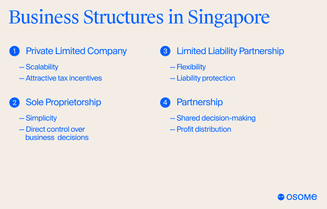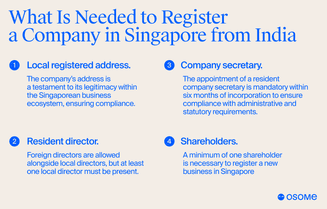Company Registration in Singapore from India: Your Step-by-Step 2024 Guide
- Published: 12 April 2024
- 12 min read
- Starting a Company


Gabi Bellairs-Lombard
Business Writer
Gabi's passionate about creating content that inspires. Her work history lies in writing compelling website copy and content, and now specialises in product marketing copy. When writing content, Gabi's priority is ensuring that the words impact the readers. As the voice of Osome's products and features, Gabi makes complex business finance and accounting topics easy to understand for small business owners.
Ready to register your company in Singapore from India? This guide will walk you through a company registration process so you can set up your business in one of Asia’s premier financial hubs. Discover the steps, legal requirements, costs, and timeframe needed to establish a company in Singapore. From choosing the most suitable business structure to completing your Singapore company registration with ACRA, this step-by-step guide covers the entire business registration process, equipping you with the knowledge to begin your journey.
Key Takeaways
- Foreign entrepreneurs, including those from India, can register and open a company in Singapore by fulfilling requirements such as having a local registered address, a resident director, and a company secretary.
- Choosing the right structure for your Singapore company is critical. Options like a private limited company, sole proprietorship, and limited liability partnership offer different benefits and liabilities.
- The Singapore company registration process generally takes 1-3 days and can be completed online. Registering a private limited company costs $315. There may also be additional post-registration financial and regulatory considerations.
Can I Register a Company in Singapore From India?
Venturing into Singapore’s dynamic market from India is a streamlined reality. Foreigners from India are fully entitled to register and open a company in Singapore, operating either as a foreign company or a local entity.
The process is simple:
- Selecting a business structure that aligns with your vision
- Giving your business a unique name
- Acquire official registration with the Accounting and Corporate Regulatory Authority (ACRA)
To navigate Singapore's financial waters, you also need a resident director and a corporate bank account. While the costs involved may vary depending on your company's size and scope, the path to registering a Singapore company is paved with clarity and opportunities.
Choosing the Right Business Structure
Selecting the right business structure is a pivotal choice as it affects tax exemptions, personal asset security, and scalability. Whether you opt for the autonomy of a sole proprietorship, the collective strength of a partnership, or the robust framework of a private limited company, each structure comes with unique strengths and challenges.

Private limited companies
To register a private limited company in Singapore, you need at least one director who is a Singapore resident to ensure your company has a local foothold in the country’s business landscape. Private limited companies come with impressive scalability and attractive tax incentives. The structure allows up to fifty shareholders, individuals or corporate entities. In addition to tax benefits, this structure preserves personal asset sanctity as shareholders’ liabilities are limited to their stake in the company.
Flexibility is another hallmark of this structure. A private limited company can operate as a subsidiary company that is more than 50% owned by a parent company. It can also act as an existing company or a separate legal entity capable of acquiring assets, entering debt, and suing or being sued in its own name.
Sole proprietorship
A sole proprietorship in Singapore offers:
- simple and direct control over business decisions
- an agile setup process
- high affordability
- minimal regulatory compliance
- various tax benefits
However, a sole proprietor's personal assets are not protected if the business fails. Therefore, smaller ventures or individual service providers often prefer sole proprietorships.
Limited liability partnership
Merging a partnership's flexibility with the protection of a private limited company, a Limited Liability Partnership (LLP) offers the best of both worlds. While the limited liability provides a safety net for your personal assets, compliance requirements for an LLP are more stringent than those for a sole proprietorship.
To register a LLP in Singapore, you need at least two partners and one manager who is a local resident. Once registered, your LLP will be assigned a Unique Entity Number (UEN). You can also select a Special UEN (SUN) for an additional layer of distinction.
Partnership
A partnership in Singapore is teamwork of two or more individuals. The partners combine their resources and talents to pursue a common business goal. This structure offers the advantage of shared decision-making and profit distribution. Therefore, a partnership is less burdensome in terms of compliance compared to a limited liability company.
Nonetheless, partnerships come with potential conflicts of interest and limited capital-raising options. Similar to a sole proprietorship, partners have unlimited liability and are accountable for the business’s debts and liabilities.
Public limited company
A public limited company is the vessel for entrepreneurs with their sights set on expansive horizons. Suited for large-scale businesses, this structure allows you to:
- Invite the public to buy shares, bolstering your capital and sharing the journey with a broader community
- List on a stock exchange with the potential for significant growth
However, you must adhere to stringent regulatory requirements and uphold shareholder interests if you decide to register a public limited company.
Requirements To Register a Company in Singapore from India
Navigating the waters of Singapore company registration from India requires meeting certain regulatory buoys. The requirements serve as a checklist that includes:
- a Singapore registered address
- a resident director
- a company secretary
- shareholders
These ensure your Singapore companies are anchored firmly in Singaporean soil.
Let’s examine each of these prerequisites more closely to understand how they shape your company’s legal and operational framework.

Shareholders
Shareholders are pivotal to any company's livelihood. At least one shareholder is required to form a new business in Singapore. Thankfully, the shareholder doesn't have to be a Singapore citizen, meaning foreign entrepreneurs can hold 100% shareholding and have complete control over their companies. This liberality in company ownership laws underscores Singapore’s openness to global business players.
Directors
A director steers a company’s course. Having at least one local resident director is a mandatory requirement for Singapore companies. However, foreign directors are permitted alongside their local counterparts, as Singapore encourages incorporating international perspectives.
Local registered address
A local registered address in Singapore is more than just a mailbox; it’s the official location for your company’s statutory documents and is the primary channel for official correspondence.
Ensuring compliance, this address is a testament to the company’s operational presence and legitimacy within the Singaporean business ecosystem.
Company secretary
The company secretary ensures that your company’s administrative and statutory requirements are met with precision. They are crucial for your company’s good standing and adherence to Singapore’s corporate regulations. You must appoint a resident company secretary within six months of incorporation. Your company secretary must be a natural person residing in Singapore.
Documents To Register a New Company in Singapore
With your company’s structural blueprints in hand, the next step is to gather the documents required in the Singapore Companies Act to bring it to life. Required information includes identification details, the company constitution, and consent forms from directors and the company secretary. Individual foreign entrepreneurs must also provide a copy of their passport and proof of overseas residential address, whereas foreign companies are expected to provide their Memorandum & Articles of Association.
Any non-English documents must be translated to ensure Singapore officials understand your business narrative clearly.

Singapore Company Incorporation
The Singapore company registration process involves:
- Appointment of key officers
- Name approval
- Document submission
We will walk you through these key milestones and provide a step-by-step guide for your company's incorporation.
1 Get your company name approved
Your company's name should be distinctive and meaningful as it indicates your business's identity. The business name you choose must not infringe on any existing trademarks. Nor can it be reserved by another entity.
Use Singapore's online tool, BizFile+, to check the availability of your desired company name. You’re also more likely to secure the name that best reflects your business’s essence by drafting up a list of alternative names in case your top choice was taken.
2 Prepare the Singapore company constitution
A company's constitution outlines your company's rules and regulations that govern the company's operations and the interactions between shareholders and directors. This document also establishes the company’s goals and authority structures, ensuring all aboard understand their rights, obligations, and the scope of their roles within the company.
A standard Singapore company constitution must include the following compartments:
- Name clause: signifies the ACRA-approved business name
- Registered office clause: your company's registered address
- Liability clause: the extent of each member's liability
- Capital clause: the company's capital amount and its share division
- Subscriber clause: The name, address, occupation, and assigned shares of each subscriber
- Rules: additional rules that govern your business activities
3 Submit the application to ACRA
With the company name secured and documents in order, it’s time to submit your application to ACRA, Singapore’s corporate regulatory body. Once submitted, the name is reserved for 120 days, giving you ample time to finalize any outstanding details.
The certificate of incorporation, which also serves as an initial employment pass, is then issued electronically, signalling the official birth of your company.
How Long Does It Take To Register a Singapore Company?
The anticipation of launching your business is palpable, and fortunately, Singapore’s efficiency means you won’t be waiting long. The typical duration for registering a company in Singapore is 1-3 days, provided your documentation is in order. Complexities may extend this to a few weeks; if subjected to a higher authority’s review, it may be up to two months.
The swiftness of the process is also contingent on shareholders' and directors' readiness to provide necessary verification documents.

How Much Does It Cost To Register a Company in Singapore from India?
Embarking on a Singaporean business venture from India involves an investment beyond just time and energy. Financially, the initial incorporation costs for a private limited company are around S$315, while other company types may differ in registration fees. Annual renewal and filing fees also factor into the financial planning, varying based on your chosen business structure.
Opening a Corporate Bank Account
Once your company is afloat, opening a corporate bank account is the next crucial step in your business journey. This account will be the treasury for your enterprise, facilitating transactions and financial reporting. The process requires providing comprehensive documentation and choosing a bank that aligns with your business needs, considering service charges, interest rates, and customer service.
For added convenience, some banks in Singapore offer remote account opening services via video conferencing, sparing you the need for an initial visit.
Tax Considerations for Your Singapore Company
Singapore’s tax regime is a siren’s call for businesses, offering some of the most favourable rates worldwide. Here are some key features:
- Singapore's corporate income tax rate is a flat 17%
- Additional tax relief initiatives and exemptions available for qualifying companies
- No capital gains tax
- Double taxation avoidance agreements ensure your business isn’t taxed twice on international transactions.
Once your revenue exceeds S$1 million, you must complete your GST registration, which is currently set at 8%. It's best to work with an accounting service provider like Osemo to ensure your taxes are in line and you take full advantage of available tax incentives.
Post-Registration Formalities
With your Singapore company now officially incorporated, it’s time to chart the course of day-to-day operations and regulatory compliance. The Certificate of Incorporation is just the beginning; next, you must ensure the company is well-equipped with a corporate bank account and the necessary business licenses to operate legally.
Companies with substantial revenue must register for GST. Meanwhile, staying vigilant about yearly fees and compliance requirements will keep your business steady.
Acquiring necessary business licenses and permits
The type of business you operate determines the licenses and permits you’ll need to secure. Each industry has regulations and required documents, from financial services to food and beverage. These permits are crucial for reducing business risks and ensuring secure and smooth business activities.
Meeting compliance and regulatory obligations
As the captain of your newly formed company, you must ensure that all hands are on deck for regulatory compliance. This includes:
- Setting the course for the first Annual General Meeting within 18 months of incorporation
- Scheduling regular AGMs each calendar year
- Navigating the intricacies of local laws
- Promptly filing tax and GST returns
- Ensuring that annual returns are filed with ACRA in a timely fashion.
Remote Registration Capabilities for Setting Up From India
Geographical boundaries are rarely a barrier to business expansion in today's digital age. The entire Singapore company registration process can be completed online, making it simple for Indian entrepreneurs to establish their presence in Southeast Asia. You won't need to set foot outside your home country other than on a few occasions, such as opening a business bank account. However, many banks today can help you complete this step remotely.
The best way to navigate your Singapore company formation is to work with a company like Osome, which specialises in Singapore registration. These companies are familiar with the Singapore Company Act and other regulations and can ensure your business meets all compliance regulations and is formed correctly.
You can appoint a nominee local director if you don't plan to relocate immediately after company formation. This allows you to manage your Singapore company from India, enjoying the perks of an international business while remaining in your home country.
Summary
Starting a new company in Singapore from India can bring significant opportunities and growth. Now that every step in this process has been demystified, all you need is patience, diligence, and attentiveness to ensure a fruitful voyage. With remote registration capabilities, your dream of establishing a business in one of the world’s most vibrant economies is within your grasp. All you need to do is set the sail.
FAQ
How can I register my company in Singapore?
To register your company in Singapore, you must sign incorporation documents, obtain consent from the directors and company secretary, and declare the company's controllers. Additionally, you must also provide details including company name, description of activities, shareholder and director information, registered business address, and share capital details. You also need a bank account for your company. Once everything is in line, you can file your application with ACRA and wait for the good news at home.
Can a foreigner register a Singapore business?
Yes, you can register a Singapore business as a foreigner. However, before making that decision, you should carefully research the advantages and disadvantages of different business structures. This will help you start your new business on the right foot.
Can an Indian start a business in Singapore?
Yes, an Indian can start a business in Singapore by registering with the Accounting and Corporate Regulatory Authority (ACRA) and complying with the same rules as local business owners. In most cases, you need at least one director who is a Singapore permanent resident.
How much does it cost to register a company in Singapore?
Registering a company in Singapore costs 300 Singapore dollars, and the fee is usually paid at the end of the registration process.
What are the benefits of starting a business in Singapore for an Indian entrepreneur?
Starting a business in Singapore offers Indian entrepreneurs advantages such as low tax rates, ease of company registration, 100% foreign ownership, and a stable political environment. The process can be done remotely, with services available for local requirements.
Get expert tips and business insights
By clicking, you agree to our Terms & Conditions, Privacy and Data Protection PolicyWe’re using cookies! What does it mean?






